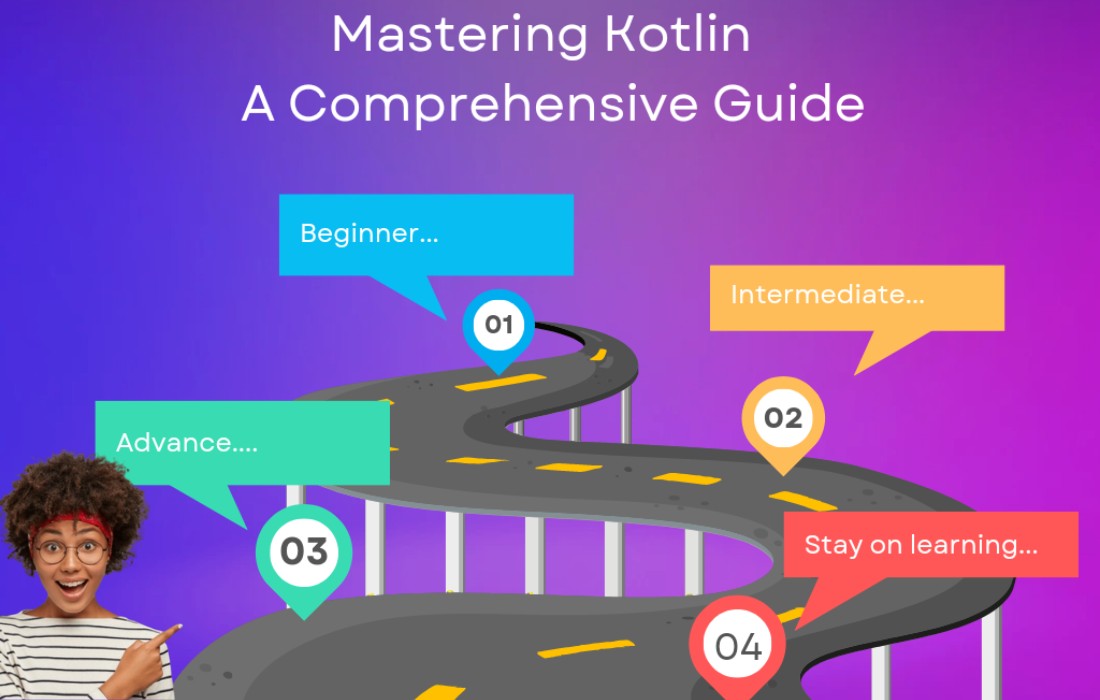Introduction to Kotlin for Android Development
Since Google’s I/O 2019, Kotlin has become the primary language for Android mobile development. With over 50
Kotlin provides several advantages in Android development:
- Less Code, Greater Readability: Kotlin offers concise syntax and readability, reducing the time spent writing and understanding code.
- Reduced Errors: With fewer common mistakes in Kotlin, developers can build more reliable and stable apps.
- Jetpack Libraries Support: Jetpack Compose is Android’s modern toolkit, and Kotlin enhances its power by providing KTX extensions, allowing developers to write cleaner, more functional code.
- Multiplatform Development: Kotlin Multiplatform allows developers to write code for Android, iOS, backend services, and web applications. Tools like Compose Multiplatform help create user interfaces (UIs) that work seamlessly across different platforms.
- Interoperability with Java: Kotlin’s seamless interoperability with Java ensures developers can mix and match Java and Kotlin codebases, facilitating smoother migration to Kotlin.
- Community Support and Growth: Kotlin’s strong community and ecosystem continue to grow, and over 95
Kotlin/Wasm: The Future of Cross-Platform Web Development
Kotlin is pushing the boundaries of cross-platform development through Kotlin/Wasm, a tool that compiles Kotlin code into WebAssembly (Wasm). This allows developers to run Kotlin applications in different environments that support Wasm, such as web browsers or standalone Wasm virtual machines.
Kotlin/Wasm supports Compose Multiplatform, allowing developers to reuse mobile and desktop UIs in web projects, creating a unified experience across platforms. The potential for Kotlin to run not just on Android but on any platform supporting Wasm marks an exciting future for cross-platform development.
Key Features of Kotlin/Wasm:
- Compile Kotlin code into Wasm format for cross-platform compatibility.
- Seamless integration with Compose Multiplatform for creating shared UIs.
- Excellent performance, outperforming JavaScript and nearing JVM speeds.
- Browser API support, allowing developers to leverage web functionalities such as DOM manipulation directly within Kotlin/Wasm applications.
Kotlin/Native: Compiling Kotlin to Native Binaries
Kotlin/Native is designed for scenarios where a virtual machine is unnecessary or undesirable, such as on embedded devices or iOS applications. With Kotlin/Native, developers can compile their Kotlin code into native binaries that run directly on hardware, without needing a runtime environment.
Key Features of Kotlin/Native:
- Target Platforms: macOS, iOS, tvOS, watchOS, Linux, Windows (MinGW), and Android NDK.
- Interoperability: Kotlin/Native allows for two-way interoperability with native languages, such as C, C++, Swift, and Objective-C.
- Libraries and Frameworks: Kotlin/Native supports integration with existing C libraries, as well as Swift/Objective-C frameworks, making it easy to incorporate Kotlin into existing native projects.
Kotlin/Native is perfect for applications where a self-contained program that doesn’t require a runtime is needed. It’s ideal for embedded systems, mobile apps on iOS, or any project requiring native performance.
Kotlin for JavaScript Development
Kotlin/JS allows Kotlin code to be transpiled into JavaScript, providing developers with the power of Kotlin in the JavaScript ecosystem. Kotlin/JS is particularly useful for web development, offering easier JavaScript interoperability, smaller executable sizes, and the ability to leverage existing JavaScript libraries.
Kotlin/JS Benefits:
- Multiplatform Projects: With Kotlin Multiplatform, you can share code between JavaScript and other platforms like Android or iOS.
- Improved Interoperability: The Kotlin/JS IR compiler ensures smoother integration with JavaScript and reduces the size of the generated executables via dead code elimination.
- JavaScript Libraries: Kotlin/JS can easily work with TypeScript and JavaScript libraries, making it a powerful tool for web applications.
Kotlin for Data Analysis
Kotlin isn’t just for mobile or web development—it’s also making waves in the data analysis space. With tools like Kotlin DataFrame, Kandy (for plotting), and Kotlin notebooks, Kotlin developers now have a rich set of tools to perform data manipulation, visualization, and analysis.
Data Analysis Tools in Kotlin:
- Kotlin DataFrame: A powerful tool for manipulating structured data, including integration with databases and support for CSV, JSON, XLS, and more.
- Kandy: A charting library that helps visualize data with Kotlin in an idiomatic and type-safe manner.
- Kotlin Notebooks: Interactive coding environments such as Kotlin Notebook, Datalore, and Jupyter provide developers with an integrated space to explore, analyze, and visualize data.
Conclusion
Kotlin’s ecosystem is rapidly evolving, offering new capabilities for Android, web, and data analysis applications. With Kotlin/Wasm and Kotlin/Native, the language is paving the way for truly cross-platform development, making it easier to write code that runs across a variety of devices and platforms. Kotlin’s powerful tools and libraries for data analysis also make it a fantastic option for developers in the data science and analytics space.
Get Started with Kotlin Today:
- Dive into Android development with Kotlin.
- Explore Kotlin Multiplatform for cross-platform solutions.
- Take advantage of Kotlin for web development with Kotlin/Wasm and Kotlin/JS.
- Enhance your data analysis skills using Kotlin’s tools and libraries.
Whether you’re a mobile developer, web developer, or data enthusiast, Kotlin provides a modern, flexible, and productive environment to create high-performance applications across platforms.












